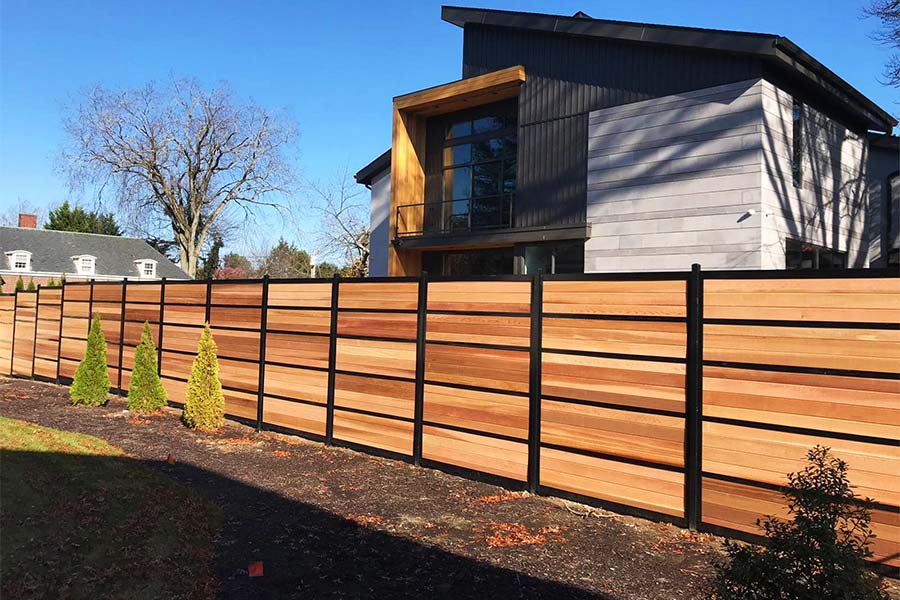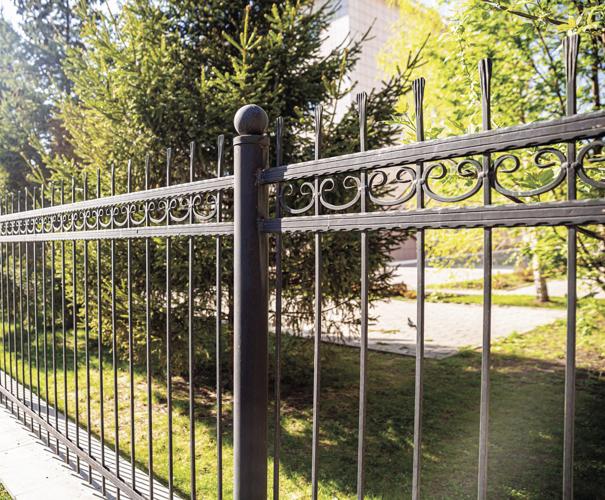Featured

Among the most prominent choices, wood, vinyl, and light weight aluminum each deal special advantages and downsides. Below's a failure of the pros and disadvantages of these 3 typical fencing products.
Wood Secure Fencing. Wood fencing has been an ageless option for house owners as a result of its all-natural elegance and flexibility.
Pros:. Visual Allure: Wood provides a timeless and cozy look that complements a selection of architectural designs. Adjustable: It can be repainted, tarnished, or cut right into special designs to match personal choices. Cost-efficient: Initially, timber fence can be an affordable choice compared to other materials. Eco-Friendly: Timber is a renewable energy and can be sustainably sourced. Cons:. High Maintenance: Timber calls for normal securing, staining, or paint to avoid rot, insect damages, and weathering. Durability Concerns: Without appropriate treatment, wood can warp, fracture, or degeneration in time, particularly in locations with high moisture. Much shorter Life-span: A timber fencing typically lasts 10-20 years, relying on the sort of timber and degree of maintenance. Wood is optimal for those that value a typical look and want to commit to its upkeep.
Vinyl Secure Fencing. Vinyl is a contemporary, low-maintenance secure fencing option that has expanded in appeal in recent years.

Pros:. Reduced Maintenance: Vinyl does not require paint, staining, or sealing and can be easily cleaned up with soap and water. Weather condition Resistant: It withstands severe climate condition without deteriorating, rusting, or bending. Durable: Plastic fences can last 20-30 years with very little maintenance. Range of Styles: Offered in lots of shades, designs, and textures, some vinyl choices mimic the appearance of timber. Disadvantages:. Higher Upfront Cost: Vinyl secure fencing can be a lot more costly originally compared to timber. Brittleness in Winter: In severe cold, vinyl might break or come to be weak. Minimal Fixes: Private panels can be tough to replace, calling for mindful matching to the existing fencing. Plastic is finest suited for home owners looking for a durable, low-maintenance service with modern visual appeals.
Aluminum Fence. Light weight aluminum secure fencing is a light-weight and long lasting option, frequently picked for its contemporary look and adaptability.
Pros:. Rust-Resistant: Light weight aluminum doesn't corrosion, making it an excellent selection for wet or humid climates. Low Upkeep: Requires marginal maintenance and is easy to tidy. Durable: While light-weight, light weight aluminum is solid enough to endure lots of environmental conditions. Long Lifespan: Can last several decades without significant wear or deterioration. Range of Styles: Offers a smooth and elegant look, typically utilized for ornamental or decorative objectives. Disadvantages:. Higher Expense: The initial investment for light weight aluminum secure fencing is greater than wood or vinyl. Much Less Personal privacy: Aluminum fences are commonly designed with open pickets, making them less effective for privacy. Susceptible to Dents: Although sturdy, light weight aluminum can be dented by solid influences. Light weight aluminum is suitable for those looking for a trendy, resilient alternative that needs minimal treatment.
Making the Right Selection. Each secure fencing product-- plastic, timber, and aluminum-- uses unique advantages and downsides. Your decision ought to rely on your details top priorities, such as spending plan, upkeep choices, climate, and aesthetic goals:
Pick wood if you enjoy a conventional appearance and don't mind routine maintenance. Choose for vinyl if you desire a low-maintenance, weather-resistant fencing with modern-day appeal. Opt for aluminum if you prioritize durability, rust resistance, and a smooth style. By considering these disadvantages and pros, you can choose a secure fencing material that enhances your residential or commercial property while meeting your practical demands.
Latest Posts
Find Outstanding Car Repair Services offered by Montclare Auto Repair – Keep Your Car Running Smoothly
Published May 27, 25
1 min read
Safeguard Your Home with Quality Residential Roof
Published May 23, 25
1 min read
Unlock Your Partner at WyHy Maximizes Your Savings on Borrowing and Banking
Published May 23, 25
1 min read
More
Latest Posts
Find Outstanding Car Repair Services offered by Montclare Auto Repair – Keep Your Car Running Smoothly
Published May 27, 25
1 min read
Safeguard Your Home with Quality Residential Roof
Published May 23, 25
1 min read
Unlock Your Partner at WyHy Maximizes Your Savings on Borrowing and Banking
Published May 23, 25
1 min read